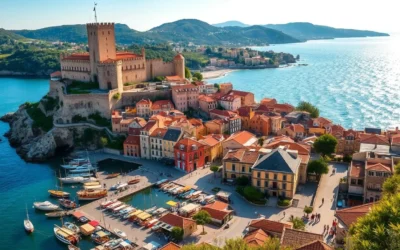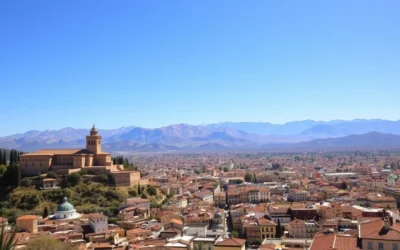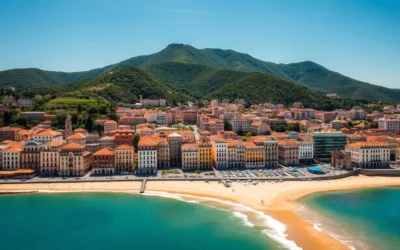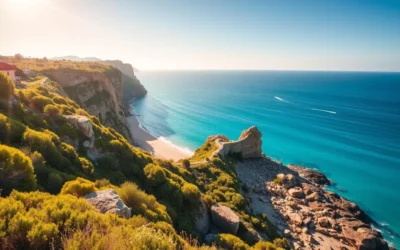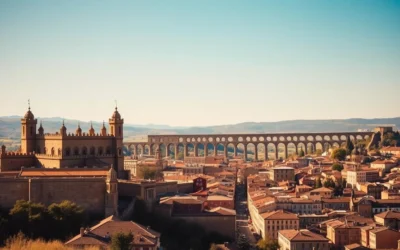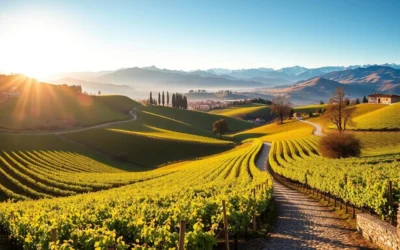✓ Accommodations✓ Flights✓ Rental Cars✓ Tours & Activities
As the final destination of the renowned Camino de Santiago pilgrimage, Santiago de Compostela is a city that embodies spiritual significance, rich history, and vibrant culture. With over 200,000 pilgrims arriving annually, this charming Galician city is a treasure trove of experiences waiting to be discovered.
You’ll find that the city’s compact nature makes it easy to explore on foot, allowing you to soak in the atmosphere of its winding alleys and historic granite streets. Whether you’re a history buff, a foodie, or simply a curious traveler, Santiago de Compostela offers a unique blend of religious heritage, architectural beauty, and local cuisine that caters to diverse interests.
As you wander through the city, you’ll encounter a welcoming atmosphere, shaped by the mix of pilgrims, students, and locals. This guide will help you uncover the top things to do in Santiago de Compostela, ensuring you make the most of your visit to this captivating city.
Discovering Santiago de Compostela: The Jewel of Galicia
Santiago de Compostela, often referred to as the Jewel of Galicia, is a place where ancient traditions meet modern vibrancy. This city is characterized by its unique blend of history, spirituality, and youthful energy, making it a fascinating destination for visitors.
The City of Pilgrims and Students
Santiago de Compostela is home to around 100,000 residents, with an additional 40,000 students during the academic year, creating a lively atmosphere. The University of Santiago, founded in 1495, is one of Europe’s oldest institutions, contributing to the city’s dynamic character. Thousands of pilgrims arrive throughout the year, completing their pilgrimage journey along the Camino de Santiago, which adds to the city’s diverse and welcoming ambiance.
| Aspect | Description |
|---|---|
| Population | Around 100,000 residents, plus 40,000 students during academic terms |
| Pilgrims | Thousands arrive throughout the year |
| University | University of Santiago, founded in 1495 |

Best Time to Visit Santiago de Compostela
The best time to visit Santiago de Compostela is from May to September, when the weather is pleasant. July and August are peak tourist months, but spring and fall offer a good balance of comfortable weather and smaller crowds. It’s advisable to spend at least 2-3 days to fully experience the city and its surroundings. Visitors should be prepared for rain, as Santiago is known to be quite rainy.
In summary, Santiago de Compostela is a place where history and modernity blend, making it an attractive destination for travelers. Whether you’re a pilgrim completing your journey or a tourist looking to explore a new city, Santiago de Compostela has something to offer.
The Magnificent Cathedral of Santiago de Compostela

The Cathedral of Santiago de Compostela stands as a testament to the city’s rich cultural heritage and spiritual significance. As the alleged burial site of Saint James, one of Jesus’ apostles, it has become one of the most revered pilgrimage sites in Christianity. The Cathedral’s grand presence is awe-inspiring, making it a must-visit destination for anyone traveling to Santiago de Compostela.
The History and Architecture of the Cathedral
The Cathedral’s history dates back to the 9th century, and its architecture reflects a blend of styles due to additions and modifications over the centuries. Originally constructed in the Romanesque style, it later incorporated Gothic and Baroque elements. The Pórtico da Gloria, sculpted by Mestre Mateo, is a highlight of the Cathedral’s Romanesque architecture and a masterpiece that draws visitors from around the world.
The evolution of the Cathedral’s architecture is a testament to the changing tastes and influences over the centuries. Its Romanesque origins are still evident, yet the later additions have enriched its design, making it a unique blend of styles.
Pilgrim’s Mass and the Botafumeiro Experience
Attending a Pilgrim’s Mass at the Cathedral is an unforgettable experience, especially when the Botafumeiro, a giant incense burner, swings through the transept. This spectacle requires eight men to operate and creates a mesmerizing sight. The Botafumeiro is not just a religious artifact but a symbol of the Cathedral’s rich traditions.
The experience of watching the Botafumeiro swing through the Cathedral is deeply moving, combining the spiritual atmosphere with a sense of awe at the engineering and tradition behind it.
Cathedral Rooftop Tours: A Bird’s Eye View
For a different perspective on this historic monument, consider joining a guided rooftop tour of the Cathedral. The tour offers breathtaking views of Santiago’s Old Town and the surrounding landscapes, providing a unique perspective on the Cathedral’s architecture. It’s a perfect opportunity to capture memorable photos.
The rooftop tour is not just about the views; it’s an opportunity to appreciate the Cathedral’s design and layout from a new angle, enhancing your understanding and appreciation of this magnificent structure.
Wandering Through the UNESCO-Listed Old Town
As you wander through the historic streets of Santiago de Compostela, you’ll discover the charm of its UNESCO-listed Old Town. This ancient area is a maze of granite streets, arches, charming squares, and historic landmarks that have been preserved since its designation as a UNESCO World Heritage Site in 1985.
Praza do Obradoiro: The Heart of Santiago
At the heart of the Old Town lies Praza do Obradoiro, the main square and beating heart of Santiago. This iconic square is where pilgrims traditionally complete their journey to the Cathedral. The square is framed by four magnificent buildings: the stunning Cathedral, the Parador Hostal dos Reis Católicos, the Colexio de San Xerome, and the Pazo de Raxoi. The grandeur of these buildings creates an unforgettable atmosphere, making Praza do Obradoiro a must-visit destination.
![]()
Rúa do Franco and Rúa da Raíña: The Famous Wine Streets
Rúa do Franco and Rúa da Raíña are the lifeblood of Santiago’s social scene, famous for their lively atmosphere and the tradition of “ir de vinos” (going for wines). These streets are lined with tapas bars and restaurants where locals and visitors alike can enjoy small glasses of wine accompanied by free tapas. As you stroll along these historic streets, you’ll discover the city’s culinary delights and vibrant nightlife.
Hidden Squares and Granite Alleyways
Beyond the main attractions, the Old Town is full of hidden squares and granite alleyways waiting to be discovered on foot. Places like Praza das Praterías, Praza da Quintana, and Praza de Cervantes offer a glimpse into the authentic Santiago, with their charming architecture and lively atmosphere. The town’s granite buildings glisten in the light, especially after rainfall, creating a magical ambiance that makes exploring the Old Town a truly unforgettable experience.
| Square/Street | Description | Notable Features |
|---|---|---|
| Praza do Obradoiro | Main square and heart of Santiago | Cathedral, Parador Hostal dos Reis Católicos |
| Rúa do Franco | Famous wine street with tapas bars | Lively atmosphere, “ir de vinos” tradition |
| Praza das Praterías | Hidden square with charming architecture | Granite buildings, lively atmosphere |
Santiago de Compostela, Spain: Best Things to Do – Top Picks for Nature Lovers
As a nature lover, you’ll find that Santiago de Compostela has plenty to offer beyond its historic landmarks. The city is home to beautiful green spaces that provide a perfect break from sightseeing.
Alameda Park: The City’s Green Lung
Alameda Park, dating back to the 16th century, is the city’s most beloved green lung. This historic park is adorned with exotic plant species and tree-lined paths, making it an ideal place for a leisurely stroll. Take a walk along the Paseo da Ferradura, where you can enjoy stunning tree-framed views of the Cathedral. The park is also home to the colorful “As Marías” statues, representing the Fandiño sisters who were known for their daily walks at precisely 2 o’clock. You can rest by the statue of the writer Valle Inclán or snap a photo with “As Marías.”

San Domingos de Bonaval Park: A Peaceful Retreat
For a peaceful retreat, head to San Domingos de Bonaval Park, designed by renowned Portuguese architect Álvaro Siza. This park sits on the grounds of a former Dominican convent and features terraced gardens, water features, and an oak grove (carballeira). It’s the perfect park to relax with a book or enjoy a picnic. Visitors can explore the park on foot and appreciate its serene atmosphere. Guided tours are available for those interested in learning about the park’s history and botanical significance.
| Park Name | Features | Best Time to Visit |
|---|---|---|
| Alameda Park | Exotic plants, tree-lined paths, “As Marías” statues | Morning or late afternoon |
| San Domingos de Bonaval Park | Terraced gardens, water features, oak grove | Any time of day for a peaceful walk |
Both parks are within walking distance from the old town, making them ideal destinations for a leisurely day of exploration in this beautiful city.
Culinary Delights: Tasting Galician Cuisine

The culinary scene in Santiago de Compostela is a vibrant reflection of Galicia’s rich gastronomic heritage. You’ll discover a unique blend of traditional and modern cuisine, emphasizing fresh seafood and local ingredients.
Mercado de Abastos: A Food Lover’s Paradise
Visit the Mercado de Abastos, a must-visit destination where rural tradition meets modern gastronomy. Here, you’ll find vendors selling Galicia’s best produce, from fresh seafood to artisanal cheeses. The market’s rural chic atmosphere, with traditional stores alongside stylish stalls, makes it a fascinating place to explore.
Must-Try Galician Specialties: Octopus and Beyond
No visit to Santiago de Compostela is complete without trying pulpo á feira, the region’s signature dish. This iconic octopus is prepared with olive oil, salt, and paprika, showcasing the simplicity and flavor of Galician cuisine. You’ll also want to sample other seafood delicacies like percebes (goose barnacles) and zamburiñas (scallops), as well as empanada gallega, a savory pie filled with seafood or meat.
Tarta de Santiago: The City’s Signature Sweet
For a sweet ending to your meal, try Tarta de Santiago, the city’s famous almond cake. Marked with the Cross of Saint James, this dessert is a perfect representation of Santiago’s culinary identity. Pair it with a glass of Albariño or Ribeiro wine for a truly authentic experience.
To fully immerse yourself in the local culinary culture, visit the city’s top restaurants during lunch or dinner time. You’ll find that many establishments pride themselves on serving traditional Galician dishes with a modern twist, ensuring a memorable dining experience.
Cultural Immersion: Museums and Artistic Experiences

Beyond its famous cathedral, Santiago de Compostela boasts a vibrant cultural landscape, with numerous museums and artistic venues. The city’s rich cultural heritage is reflected in its many museums, each offering a unique perspective on the city’s history, art, and traditions.
Museo das Peregrinacións: Understanding the Pilgrim’s Journey
The Museo das Peregrinacións is a must-visit for anyone interested in understanding the historical and cultural context of the Camino de Santiago. This museum showcases a fascinating collection of artifacts, maps, and multimedia displays that document the pilgrim experience through the centuries.
Centro Galego de Arte Contemporánea: Modern Art in a Historic Setting
The Centro Galego de Arte Contemporánea (CGAC) is a striking modern building designed by architect Álvaro Siza, located next to the Convent of San Domingos de Bonaval. This contemporary art museum offers a thought-provoking contrast to the historic cathedral and surrounding architecture, making it a fascinating addition to the city’s cultural landscape.
Image of Centro Galego de Arte Contemporánea
Festivals and Cultural Events Throughout the Year
Santiago de Compostela hosts a wide range of festivals and cultural events throughout the year, including the Festas da Ascensión in May and Festas do Apóstolo in July. These events celebrate the city’s rich cultural heritage and offer a unique insight into its traditions and customs. To stay up-to-date with the latest exhibitions, concerts, and cultural tours, be sure to check the city’s official tourism website during your visit.
Image of Festas da Ascensión
Exciting Day Trips from Santiago de Compostela
Santiago de Compostela is surrounded by a wealth of attractions that make for perfect day trips, showcasing the best of Galicia’s landscapes. You can explore the region’s diverse natural beauty, rich history, and vibrant culture through various organized tours or self-guided excursions.

Finisterre and Muxía: The End of the Earth
For many pilgrims, Finisterre, or Fisterra in Galician, marks the “end of the earth,” a dramatic cape that signifies the culmination of their Camino journey. You can visit Finisterre and the nearby town of Muxía on a guided tour, enjoying the stunning ocean views, picturesque sunsets, and the spiritual ambiance that pervades these coastal towns. The tradition of burning an item of clothing or boots at Finisterre symbolizes the end of the pilgrimage way, a ritual that many find deeply meaningful.
Rías Baixas: Wine Region and Coastal Beauty
The Rías Baixas region is renowned for its exceptional Albariño wines and breathtaking coastal scenery. On a day trip to this area, you can visit wineries, explore charming fishing villages, and savor fresh seafood. The combination of wine tastings, scenic views, and local cuisine makes for a memorable experience, showcasing the best of Galicia’s gastronomic delights.
Catedrais Beach: Natural Cathedral by the Sea
Catedrais Beach, or Playa de las Catedrales, is a natural wonder where massive rock arches resemble gothic cathedrals when exposed at low tide. This beach, named one of Spain’s most beautiful by National Geographic, is a must-visit destination on any day trip to the Galician coast. The unique geological formations and the dramatic tidal changes create an unforgettable experience, making it a highlight of any tour to the area.
Conclusion: The Timeless Charm of Santiago de Compostela
Santiago de Compostela’s timeless charm is a result of its rich history, stunning architecture, and vibrant culture. This city offers a unique blend of spiritual significance, architectural beauty, culinary excellence, and cultural richness, making it a destination that caters to diverse interests. Whether you’re a pilgrim completing the Camino Santiago or a tourist exploring a new place, you’ll find that Santiago de Compostela has something special in store for you.
The city’s magnificent cathedral, atmospheric old town streets, and delicious food and wine experiences are just a few of the essential things you shouldn’t miss. As both an endpoint for pilgrims and a starting point for exploring the wider Galician region, Santiago de Compostela serves as a gateway to new adventures. With 3-4 days, you can experience the city’s highlights and take day trips to nearby attractions.
Many visitors return to Santiago year after year, drawn by its charm and the way it continues to reveal new secrets. For the latest information on cathedral opening times, museum hours, and special events, check the official tourism websites. Santiago de Compostela’s blend of history, spirituality, and modern city life creates an unforgettable destination that stays with you long after you’ve returned home.
The above is subject to change.
Check back often to TRAVEL.COM for the latest travel tips and deals.

